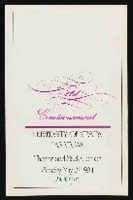Search the Special Collections and Archives Portal
Search Results

Transcript of interview with Joy Snyder by Lisa Gioia-Acres, December 17, 2009
Date
Archival Collection
Description
Joy Snyder, born and raised in Pennsylvania, is the daughter of Jean Dasinto and stepdaughter of Ray Hunt. Though she was raised thinking she was an only child, she shares that as an adult, she was contacted by an aunt who gave her information about an Austrian half-sister. The half-sister had tracked the family through WWII records on her biological father! Joy was raised in a very large extended Italian family (her maternal grandmother was first-generation Italian) and became the first in her family to attend college. She had decided early on that she wanted to be a nurse and chose to attend Temple University Hospital in Philadelphia. She recounts memories of her earliest work there, which began the first week of school. After graduation from nursing school, Joy married her childhood sweetheart, William (Bill) Snyder. They made the move to Las Vegas in 1978 and Joy found work right away at Desert Springs Hospital. She worked there about six months and then took maternity leave after the birth of their second son. When she returned to work, it was at Sunrise Hospital (early 1979) in the newborn nursery. Joy comments on many aspects of her career, including the informal approach to health care, the effects of desert climate on mothers and newborns, and the changes she has seen at Sunrise Hospital. She also comments on adoption practices in Las Vegas, drug-addicted babies, and cultural attitudes that appear during the birthing process. Today Joy is retired and her husband Bill is close to retiring. They feel a strong connection to Las Vegas (Bill has a school named after him), but maintain a second home in New York for their trips back East to visit friends and family. They also keep up with various community activities, including book clubs and running clubs for the children at William Snyder Elementary School.
Text

Kaku Makino and Masako "Julie" Ishitsuka oral history interview: transcript
Date
Archival Collection
Description
Oral history interview with Kaku Makino and Masako "Julie" Ishitsuka conducted by Kristel Peralta, Vanessa Concepcion, Ayrton Yamaguchi, and Stefani Evans on March 22, 2021 for the Reflections: The Las Vegas Asian American and Pacific Islander Oral History Project. In this interview, Makino discusses his early life in Tokyo, Japan and becoming a chef. He recalls arriving to the United States in 1989, establishing the Todai (now Makino Sushi & Seafood Buffet) restaurant chain, and opening nineteen locations in California, Florida, and in Hawaii. Kano talks about her upbringing in Otsu, Shiga Prefecture, Japan and describes Japan during the Meiji era. She remembers arriving to Las Vegas, Nevada in 2000 and the cultural change she experienced. Lastly, Makino and Kano discuss the restaurant industry during the COVID-19 pandemic.
Text

Alpha Kappa Alpha Sorority, Theta Theta Omega Chapter "Tea Rose Talk" newsletters
Date
Archival Collection
Description
From the Alpha Kappa Alpha Sorority, Incorporated, Theta Theta Omega Chapter Records (MS-01014) -- Chapter records file.
Text

University of Nevada, Las Vegas (UNLV) 21st commencement program
Date
Archival Collection
Description
Commencement program from University of Nevada, Las Vegas Commencement Programs and Graduation Lists (UA-00115).
Text
Brenda Pearson (Clark County Education Association) oral history interview conducted by Magdalena Martinez and Peter Grema: transcript
Date
Archival Collection
Description
From the Lincy Institute "Perspectives from the COVID-19 Pandemic" Oral History Project (MS-01178) -- Education sector interviews file.
Text

Nevada Southern University law program: reports and correspondence
Date
Archival Collection
Description
Folder contains memorandums, correspondence related to the law program at Nevada Southern University (later UNLV). It includes a report on the NSU law program (fall term 1967-1968), a report of the Association of American Law Schools Committee on Guidelines for New Law Schools (1966), and a report of Dean Willard H. Pedrick, Arizona State University College of Law (1967). From the University of Nevada, Las Vegas William S. Boyd School of Law Records (UA-00048).
Text

William O'Neill McCurdy Sr. oral history interview: transcript
Date
Archival Collection
Description
Oral history interview with William O'Neill McCurdy by Claytee D. White on January 26, 2022 for the African Americans in Las Vegas: A Collaborative Oral History Project. In this interview, McCurdy describes his childhood growing up in Las Vegas, Nevada, graduating from Valley High School, and attending Western Nevada College in Carson City, Nevada. He worked for many years for the Parks and Recreation department, and has served on numerous boards including the Citizens' Advisory for Regional Transportation (RTC), Habitat for Humanity Board of Director, Mineral County Economic Advisory Committee, City of Las Vegas Community Block Grant Advisory Board, and Southern Nevada Regional Housing Authority Commission. Currently, McCurdy owns McCurdy & McCurdy Media Group, a political consulting and advertising firm which has assisted numerous political candidates in fulfilling their dreams of helping to govern Las Vegas, Clark County, the State of Nevada, and even in the United States Congress.
Text

Stephen Round oral history interview: transcript
Date
Archival Collection
Description
Oral history interview with Stephen Round conducted by Claytee D. White on October 25, 2017 for the Remembering 1 October Oral History Project. In this interview, Stephen A. Round, a career military contractor, describes his experiences during the 2017 mass shooting in Las Vegas, Nevada. Round mentions moving to Las Vegas in 2013 and in later years staying at the Aria on the evening of October 1. He describes the chaos of the shooting and the 12-hour-plus lockdown at the Aria hotel and casino. The day after the shooting, Round built a memorial around the shooting site and protected it. Once the memorabilia of that first site was taken to the Clark County Museum, he moved to protect the second memorial at the "Welcome to Las Vegas" sign where crosses devoted to the victims had been placed. Along with his preservation of the memorials, Round describes his preparation of a book that was signed by many who visited the sites. Round explains that he was able to see some of the best and worst of humanity during those days of watching and caring for the memorial sites as well as helping any victims, families of the victims, and sympathizers of the Las Vegas 2017 shooting.
Text

David Becker oral history interview: transcript
Date
Archival Collection
Description
Oral history interview with David Becker conducted by Claytee D. White and Barbara Tabach on May 15, 2018 for the Remembering 1 October Oral History Project. In this interview, Becker recalls being on a three-day assignment at the Route 91 Harvest Country Music Festival across from the Mandalay Bay Resort in Las Vegas, Nevada. Thinking the gunfire was produced by malfunctioning equipment, he took photos of the scattering crowd. Moments later, in a now silent venue, he realized he captured a horrific massacre. Becker recalls photographing people leaving the venue as they performed acts of heroism, helping the fallen or the slow to reach safety. He discusses how difficult it is to comprehend the acts of that night, and how his photojournalist instincts allowed him to capture such devastating images.
Text

Joy Rineer oral history interview: transcript
Date
Archival Collection
Description
Oral history interview with Joy Rineer conducted by Claytee D. White on December 07, 2017 for the Remembering 1 October Oral History Project. In this interview, Rineer discusses her upbringing in Las Vegas, Nevada. She describes her career as an architect, designing the Resilience Center for those affected by the 1 October shooting, and the city’s response to the shooting. Later, Rineer describes helping the grief-stricken city through architecture, establishing the Leadership Las Vegas program, and organizing blood drives. Lastly, Rineer discusses the changes in Las Vegas after the tragedy.
Text
